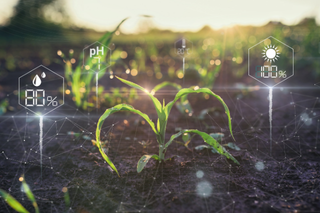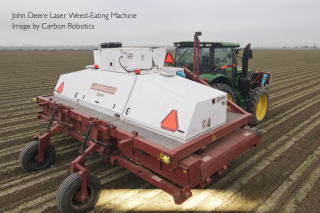Artificial Intelligence in Agriculture

We see the integration of Artificial Intelligence (AI) making inroads in the way farmers cultivate and manage their crops. As global food demand rises, AI has become a vital tool in optimizing crop yields, reducing waste, and improving resource allocation. In this article, we will explore the features and benefits of AI in agriculture, including John Deere’s new laser weed-eating machine.
Precision Farming
One of the most significant advantages of AI in agriculture is precision farming. By using advanced sensors, drones, and satellite imaging, farmers can gather detailed data on soil conditions, crop health, and weather patterns. This data is then analyzed using machine learning algorithms to provide insights on optimal planting, irrigation, and harvesting strategies. This data-driven approach helps reduce crop failure and boost productivity.
Crop Monitoring
AI-powered systems use computer vision to detect early signs of disease, pests, and nutrient deficiencies.
These tools allow farmers to act quickly, minimizing crop loss and reducing pesticide use. Subtle changes in plant health can also be identified, helping farmers fine-tune irrigation and fertilization.
Automated Farming
Autonomous farming equipment, such as tractors and drones, is becoming increasingly popular. These machines utilize AI to navigate and perform tasks such as planting, spraying, and harvesting, and can operate continuously, reducing labor costs and increasing efficiency. John Deere’s new laser weed-eating machine is a prime example of automated farming technology.
John Deere’s Laser Weed-Eating Machine
An example of AI that is coming is John Deere’s laser weed-eating machine. Equipped with high-resolution cameras and machine learning, it identifies weeds in real time and eliminates them using precision lasers. This has the potential to reduce the need for chemical herbicides and minimizes crop damage.

Livestock Management
AI is also being used in livestock management to improve animal health and productivity. Machine learning algorithms can analyze data on animal behavior, nutrition, and health to identify early signs of disease. This enables farmers to take proactive measures to prevent the spread of disease and reduce the use of antibiotics.
Benefits of AI in Agriculture
The benefits of AI in agriculture are numerous. Some of the most significant advantages include:
Increased Efficiency: AI can automate many tasks in agriculture, reducing labor costs and
increasing efficiency.
Improved Crop Yields: AI-powered precision farming and crop monitoring systems can optimize crop yields and reduce waste.
Reduced Chemical Use: AI-powered weed control systems, such as John Deere’s laser weed-eating machine, can reduce the use of chemical herbicides.
Enhanced Animal Health: AI-powered livestock management systems can improve animal health and productivity.
Data-Driven Decision Making: AI provides farmers with detailed insights on soil conditions, crop health, and weather patterns, enabling them to make data-driven decisions.
In Summary
AI is reshaping agriculture by making farming more efficient, sustainable, and productive. Technologies like John Deere’s laser weed-eating machine highlight the potential of AI to reduce chemical use and improve crop management. As these tools continue to evolve, they will play a critical role in feeding a growing global population.

Daniel Pesek
Daniel Pesek, Director of IT based out of Monticello, is a seasoned IT professional with over 20 years of experience. With expertise spanning the entire IT spectrum, including application development, network and infrastructure management, cybersecurity, artificial intelligence, and strategic planning. Daniel has a passion for creative problem-solving and has successfully designed & implemented tailored solutions which catered to the diverse needs of organizations, fostering growth, efficiency, and competitiveness. Throughout his career, he has remained committed to staying at the forefront of emerging technologies, ensuring that his skills and knowledge remain relevant and effective in today's rapidly evolving digital landscape.